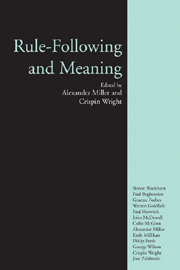Book contents
- Frontmatter
- Contents
- Acknowledgements
- The Contributors
- 1 Introduction
- 2 Skepticism and Semantic Knowledge
- 3 The Individual Strikes Back
- 4 Wittgenstein on Following a Rule
- 5 Wittgenstein, Kripke and Non-Reductionism about Meaning
- 6 Kripke on Wittgenstein on Rules
- 7 Critical Notice of Colin McGinn's Wittgenstein on Meaning
- 8 Meaning and Intention as Judgement Dependent
- 9 The Rule-Following Considerations
- 10 The Reality of Rule-Following
- 11 Truth Rules, Hoverflies, and the Kripke–Wittgenstein Paradox
- 12 Kripke on Wittgenstein on Normativity
- 13 Meaning, Use and Truth
- 14 Kripke's Normativity Argument
- Guide to Further Reading
- Index
13 - Meaning, Use and Truth
- Frontmatter
- Contents
- Acknowledgements
- The Contributors
- 1 Introduction
- 2 Skepticism and Semantic Knowledge
- 3 The Individual Strikes Back
- 4 Wittgenstein on Following a Rule
- 5 Wittgenstein, Kripke and Non-Reductionism about Meaning
- 6 Kripke on Wittgenstein on Rules
- 7 Critical Notice of Colin McGinn's Wittgenstein on Meaning
- 8 Meaning and Intention as Judgement Dependent
- 9 The Rule-Following Considerations
- 10 The Reality of Rule-Following
- 11 Truth Rules, Hoverflies, and the Kripke–Wittgenstein Paradox
- 12 Kripke on Wittgenstein on Normativity
- 13 Meaning, Use and Truth
- 14 Kripke's Normativity Argument
- Guide to Further Reading
- Index
Summary
For a large class of cases-though not for all-in which we employ the word “meaning” it can be defined thus: the meaning of a word is its use in the language.
Wittgenstein (1953, §43)The purpose of this paper is to defend Wittgenstein's idea – his so-called “usetheory” of meaning – against what is perhaps the most influential of the many arguments that have been levelled against it. I'm thinking of Kripke's critique of “dispositionalism”, which is a central component of his celebrated essay, Wittgenstein on Rules and Private Language. Kripke argues that meaning a certain thing by a word is not a matter of being disposed to use it in a certain way. And his argument has been well-received. Most commentators, whatever they say about Kripke's overall line of thought (leading up to his “sceptical conclusion” about meaning), tend to agree at least that the use-theory has been elegantly demolished. My main objective is to combat this impression.
Just what Wittgenstein himself had in mind is not entirely clear; but that's not my topic. Rather, what I want to do here is to explore and support a certain version of the use-conception of meaning – one which seems to me to have some attractive features (and which I believe can be pinned on Wittgenstein).
- Type
- Chapter
- Information
- Rule-Following and Meaning , pp. 260 - 273Publisher: Acumen PublishingPrint publication year: 2002
- 1
- Cited by



